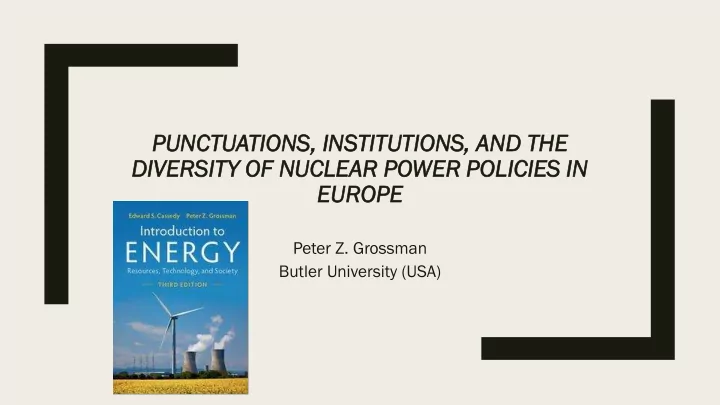

PUN UNCTU TUATIO TIONS, NS, IN INSTITU TITUTIONS, TIONS, AND TH THE E DIV IVERSIT ERSITY Y OF OF NU NUCLEAR LEAR POWER ER POL OLIC ICIES IES IN IN EU EUROP OPE E Peter Z. Grossman Butler University (USA)
Central question: ■ Energy-related shocks/crises have affected nuclear power policies in countries across Europe – But the same shocks have not impacted policies the same way – How to explain and understand these differences – What does this mean for the future of nuclear power in Europe
Underlying question: Do we need more nuclear power? ■ Pro: Hansen et al – Only non-carbon baseload (except some hydro) ■ Safe and getting (inherently) safer ■ Con: Jacobson et al. – Inherently too expensive (US especially!); too dangerous ■ My view is closer to Hansen’s – Will EU countries accept MORE nuclear power? ■ How? Why not?
Initial framing ■ Much of nuclear policy has been Shock/crisis driven ■ Punctuated Equilibrium Theory (PET) – Policy typically changes little-incrementalism (Lindblom) ■ Analog of speciation (Eldridge/Gould) – But events could lead to sudden and dramatic policy change, Punctuat nctuations ions, from Shocks ■ Could lead to, but…
Attention ■ The shock would thrust the issue into prominence ■ Attention would increase – Policy entrepreneurs would be motivated by the increased attention to move policy in a new direction
But would that mean significant policy change? ■ Maybe… ■ Would depend on how well the attention was sustained ■ Which would depend on whether the shock morphed into something like a crisis – Or at least was kept alive by subsequent events
Feedback ■ Positive and the likelihood of policy change grows ■ Negative, incrementalism resumes – In some sense whether it does or not depends on factors outside of the shock
Catching fire ■ A shock leads to a change when – It ”catches fire” --??? – Is near a “tipping point” ■ E.g. wide discussion of energy problems pre-1973 embargo – US book “The Energy Crisis” 1972 – Path dependency – Serendipity?
The argument ■ Policy change depends on how the shocks are processed by existing institutions, history and culture – More important than demographics, levels of technology, geography, etc. ■ History – Path dependency can top the latest news ■ Political institutions ■ Culture – Can block acceptance of new technologies, or or lead to their adoption
Three cases ■ Three European countries – France, Germany and Sweden ■ Three shocks, the same shocks at the same time ■ Three impacts on nuclear policies
The 1973-4 oil crisis ■ Stimulated nuclear power development especially in France and Germany – Same rationale to lessen dependence on oil – Sweden also had the same policy goal although already some antinuclear sentiment and ties between antinuclear groups and the Center Party ■ Planned more nuclear plants but emphasized renewables
Three Mile Island ■ No significant policy impact in Germany or France (a short term dip in public support) ■ In Sweden led to a national referendum on nuclear power – Which had an antinuclear result – Later legislation called for the end of nuclear power by 2010
Chernobyl ■ Germany: Led to the rise of the Green Party and to a phase out plan after the Greens entered government (years later) – Antinuclear policies adopted by the Social Democrats – Slow but persistent feedbacks ■ Path dependency ■ Sweden: Reinforced referendum result ■ France: No lasting impact
Comparative institutions, history, culture ■ Examples: ■ Political systems – Though all a form of representative democracy, all had major differences ■ History – Germany’s place on the front lines of the Cold War ■ Culture – French regard for experts; Sweden’s egalitarianism
Current state ■ Germany moving toward a nuclear-free electric system by 2022 ■ Sweden phase out not likely until the 2040s (if then) ■ France: pledge to cut nuclear role but from 75% to around 50%
Implications for the future ■ Nuclear power can/should play a role in decarbonization – Must overcome path dependencies – Face political and cultural obstacles ■ Especially in Germany where each new accident reinforces antinuclear sentiment – Witness Fukushima ■ (Apparently) inherent safety (AP1000, ESBWR) not likely to be sufficient for Germany or the EU generally – No traction for records of safety and performance (e.g. South Korea) – And the probability of accidents is non-zero ■ Pronuclear: Needs a record of success — over time — perhaps of SMRs – Learning effects, changing need, incomplete decarbonization with renewables – Subsidies at least in the short run – Pronuclear change is possible in some of the countries of Europe — France – New Shock ■ E.g. persistent power failures
Further work and contact ■ Current attitudes to nuclear power ■ Interest in SMRs, other advanced technologies ■ Deeper look at history and culture ■ To see the paper or other work: – pgrossma@butler.edu
Recommend
More recommend